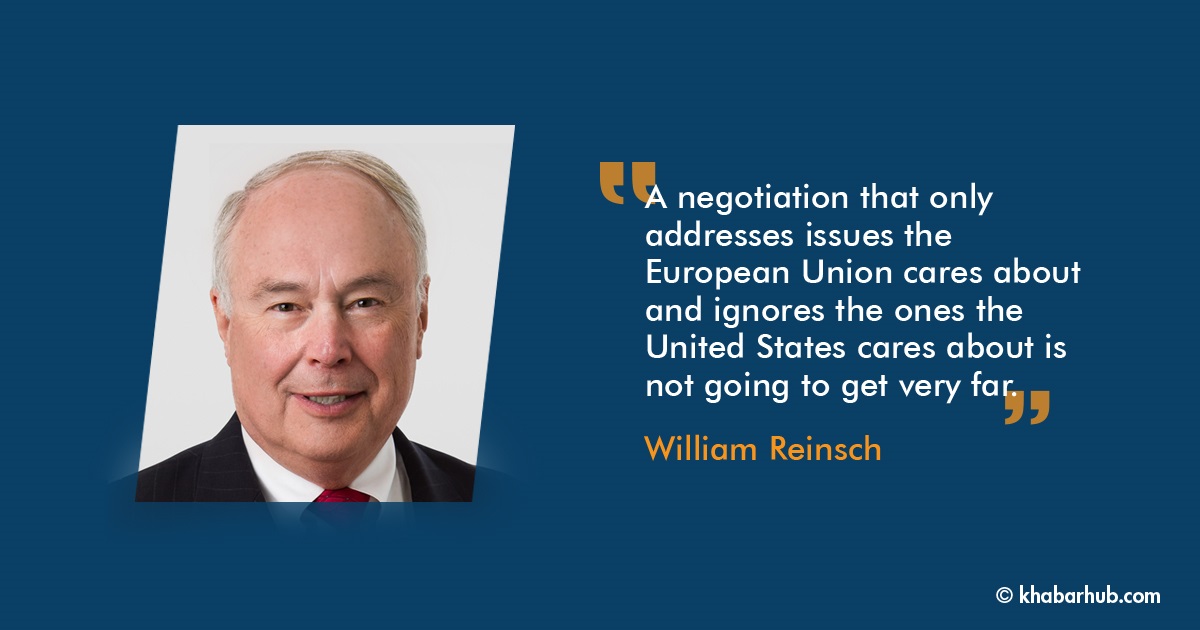We should expect the incoming administration’s trade policy to unfold slowly and carefully, without any sudden moves.
President-elect Biden will bring a distinctly different approach to the conduct of trade policy even while some of his objectives remain the same as the outgoing administration’s.
The biggest difference lies in competing world views. President Trump is a confirmed unilateralist not interested in working with others.
Biden is an equally confirmed multilateralist and believer in coalitions, cooperation, and multilateral institutions.
He has already indicated his intent to rejoin the Paris Agreement and the World Health Organization, and we can stop worrying about a sudden tweet announcing the United States is leaving the World Trade Organization (WTO).
Indeed, the decision on the new WTO director-general has been postponed to give the new administration the opportunity to approve the selection of Ngozi Okonjo-Iweala, which the Trump administration has been blocking.
Saying future trade agreements should benefit workers is easy; deciding what to put in an agreement that would actually do that, is far more difficult.
We should expect renewed and more positive U.S. engagement with the WTO and an effort to settle the disputes that have paralyzed it, even though Biden’s view of those disputes is not much different from Trump’s—indeed, some of them were issues for Obama as well.
For Biden, Trump’s trade policies have been a case of right diagnosis, wrong prescription. The Biden team will agree with many of Trump’s criticisms but will seek a different path to a solution.
For example, Democrats’ view of the challenge China poses in terms of subsidies, forced technology transfer, and favoritism to state-owned enterprises is not all that different from the Republican view, and both parties are motivated to take a hard line due to national security concerns.
However, Biden will try to deal with China through a coalition of like-minded countries and negotiation rather than unilateral tariffs.
Both assembling a coalition and then approaching China will take time. Meanwhile, decoupling will proceed, driven not by U.S. government policy, but by China’s go-it-alone policies as well as Western companies’ discomfort with Chinese leader Xi Jinping’s repressive human rights policies.
Even if Biden is able to mobilize other countries on China, the prospects for economic reform are limited, not because U.S. demands are bad economics—they would actually promote Chinese growth—but because they are bad politics for the Chinese Communist Party, which believes that moving in a more market-oriented direction would undermine its control.
Biden differs from Trump in that he views relationships holistically rather than compartmentalizing them. He will see the importance of a stronger U.S. presence in the Indo-Pacific and will likely see being part of CPTPP as an integral part of that.
We can expect a year or two to be devoted to Biden’s coalition approach, but when that fails, he will be pressed by Congress to consider other, more aggressive approaches, which will further accelerate decoupling.
Here at home, Biden will want to make sure the benefits of trade accrue to workers and not just corporations, and he will use trade policy as a means of furthering and enforcing his environmental objectives.
Trump gave lip service to the former and ignored the latter completely. It is already apparent that a simple return to the open trade policies of administrations before Trump is not going to happen.
There is not sufficient support for that in either party at the moment, but developing a new policy is going to take some time.
Saying future trade agreements should benefit workers is easy; deciding what to put in an agreement that would actually do that, is far more difficult.
On trade agreements, Trump favored bilaterals; Biden favors none, at least in the beginning, preferring to focus on the enormous domestic problems we face.
We are being told not to expect any sudden moves, both with respect to the removal of Trump actions, like the many tariffs he put in place, or to new initiatives.
Unfortunately for Biden, trade is a much greater part of our economy than it used to be, and an administration ignores it at its peril.
Failure to move forward risks making the same mistake Obama made of waiting so long to start anything that there was no time left to finish.
To compound the problem, there will be trade issues on his desk the first day—among others, pending negotiations with the United Kingdom, Kenya, and Japan, which must be concluded by April 1 if they are to benefit from the fast-track congressional procedures in current law; the aforementioned tariffs on steel, aluminum, and China, which are not popular nor have they achieved their objectives; the Boeing-Airbus dispute, where both sides have imposed retaliatory tariffs on each other; and proposed, and in some cases already implemented, digital services taxes that primarily affect U.S. companies.
Also, if Biden wants to renew Trade Promotion Authority in order to permit future trade negotiations, even if none are currently planned, he will need to move soon to forestall its expiration on June 30.
At this point, it appears his administration will not do that—a decision it will come to regret. The administration at some point will need it and will realize too late that it is easier to get it sooner rather than later.
One of Biden’s most consequential decisions will be whether to join the Comprehensive and Progressive Agreement for Trans-Pacific Partnership (CPTPP), and here his advisers are divided between those who believe joining is a necessary element of a policy of reaffirming the U.S. commitment to the Indo-Pacific region and those concerned about the domestic opposition to the Trans-Pacific Partnership and the likelihood he will have to expend significant political capital to join its successor agreement.
A negotiation that only addresses issues the European Union cares about and ignores the ones the United States cares about is not going to get very far.
Biden differs from Trump in that he views relationships holistically rather than compartmentalizing them. He will see the importance of a stronger U.S. presence in the Indo-Pacific and will likely see being part of CPTPP as an integral part of that.
Ultimately, he will adopt the same strategy President Clinton used with the North American Free Trade Agreement, President Obama with the United States-Korea Free Trade Agreement, and Speaker Pelosi used with the United States-Mexico-Canada Agreement (USMCA): criticize the existing agreement as inadequate; promise to fix it; open negotiations on possible changes; and if the negotiations succeed, pronounce the agreement acceptable as revised and then rejoin.
This will not happen quickly—it will take at least two years—and the outcome is uncertain since it depends on the negotiations, but experience with the USMCA shows that it is still possible to build a bipartisan pro-trade coalition for a specific agreement.
The other big early decision is how to approach Europe. Any coalition aimed at dealing with China will necessarily include Europe, but transatlantic relations have deteriorated sharply in the past four years, and Biden is committing to restoring them.
While much of that will be about NATO and Russia, the European Union has also proposed a reset in the trade relationship via a transatlantic trade agenda the Commission proposed.
Their goal seems to be to resolve the outstanding issues that irritate them, such as the Boeing-Airbus subsidy issue and the digital services tax, rather than negotiate a comprehensive trade agreement, which neither side appears to have much interest in at the moment.
That only takes us so far. Boeing-Airbus is in the “cleaning up the mess” category that will require a serious negotiation, and the digital services tax is already in the process of being addressed through negotiations via the Organization for Economic Cooperation and Development (OECD) where the United States has not so far played a particularly constructive role. But at least in those cases, the path to resolution is fairly clear, even if difficult to achieve.
However, if it ends up as an effort to reshore manufacturing, it could be consequential. Whether the preferred tool is a carrot—an incentive to return—or a stick, a penalty for those who do not, it will end up in the tax code, which means legislation.
Unfortunately, there are also other problematic trade issues that divide the transatlantic relationship, including the European Union’s sharply different approaches to digital governance and privacy, which are rapidly becoming the default options for U.S. companies that have no coherent policy from Washington to fall back on, and the European Union’s agriculture policies, including subsidies, use of geographical indications to protect their products, and prohibitions on genetically modified organisms that have no basis in science.
The latter is an old issue that at least the last six administrations have failed to solve, but that does not make it any less important.
A negotiation that only addresses issues the European Union cares about and ignores the ones the United States cares about is not going to get very far.
Most of these issues do not require congressional permission to tackle, although some will need congressional approval of any result.
There are others, however, that will need congressional authorization to get them off the ground. Chief among those is the Biden’s Buy American campaign. It is not entirely clear what shape that will take.
If it ends up being about federal procurement, it will irritate the European Union and Canada but will not make much difference economically, since most federal procurement is already domestic.
However, if it ends up as an effort to reshore manufacturing, it could be consequential. Whether the preferred tool is a carrot—an incentive to return—or a stick, a penalty for those who do not, it will end up in the tax code, which means legislation.
At the same time, U.S. Trade Representative-designate Katherine Tai must begin the process of detailing what a new twenty-first century trade policy should look like.
The best approach is carrots, not sticks. Companies will do what is in their economic interest, and the real challenge is to get them to see their interest as long-term success, not quarterly earnings.
Incentives that alter their calculations are probably better than penalties that might encourage them to move entirely offshore.
Either way, however, the odds of success are long in a closely divided Senate, where liberals will oppose tax cuts, and conservatives will oppose tax increases without much regard to the policy objectives behind them.
That is a full plate, and just a part of what will be served up in the next few months. Biden will have to juggle addressing these and other pending issues.
He will find out, if he has not already, that they may not be urgent to the United States but are urgent to his counterparts in other countries who have been affected by Trump’s actions.
At the same time, U.S. Trade Representative-designate Katherine Tai must begin the process of detailing what a new twenty-first century trade policy should look like.
That will require extensive consultation with Congress, which, fortunately, is one of her strengths, having spent some years there as the key trade staff member for the House Ways and Means Committee.
(William Reinsch holds the Scholl Chair in International Business at the Center for Strategic and International Studies in Washington, D.C.)
Copyright: Center for Strategic and International Studies.









Comment